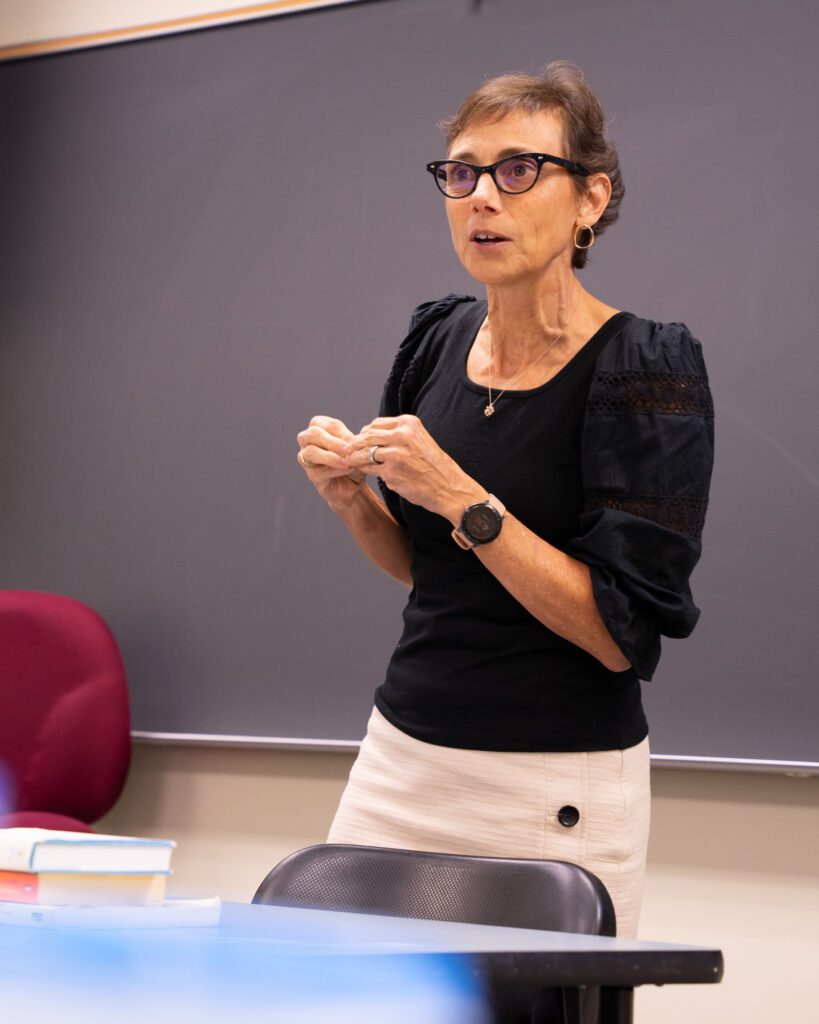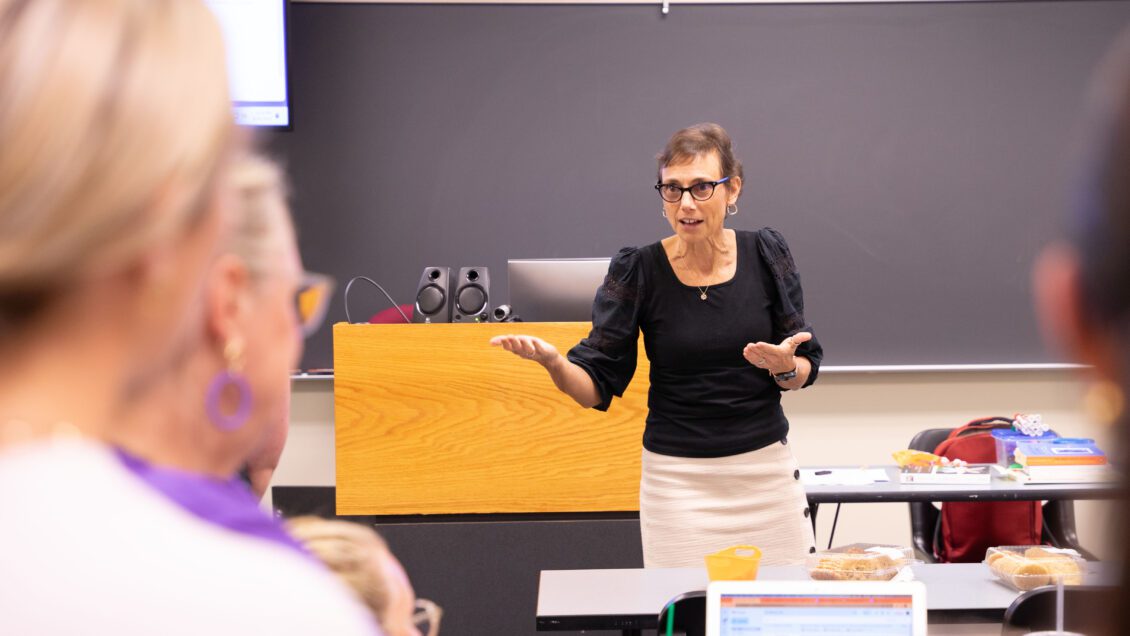Amanda Rumsey is an associate professor in the College of Education Department of Education and Human Development. Rumsey’s work focuses on children and adolescents, trauma, and school counseling, emphasizing training needs and skill acquisition in suicide intervention, addictions, trauma and multiculturalism. Rumsey also serves as the project leader on a $5.8 million project with Greenville County Schools to positively affect the ratio of students to school counselors in the district.
Rumsey has served many roles in education over the years, but all of those roles share a common component of helping people. We caught up with Rumsey to talk about her approach to both the classroom and research, how her career has evolved, and what tips she would give to students interested in the counseling profession.
What is your teaching philosophy?
I strive to provide active, meaningful and challenging learning opportunities in a safe and supportive environment. Building and maintaining relationships is the first and most critical step in this process. This includes relationships with students, colleagues, practitioners and community members.
From a social learning perspective, we constantly learn from our interactions. Formal learning is supported through the intentional facilitation of critical discussions and interactions among individuals. Social and cultural learning are significant pieces of any subject matter I teach. Therefore, meaningful learning is supported by including experiential activities that include active participation and self-reflection in the construction of knowledge. I strive to know my curriculum and students enough to recognize when and how to use challenge and encouragement to best advance growth, ultimately bolstering students to take control of and become active participants in their learning.
Why do you love teaching?
I love seeing the students’ energy, excitement and hope as they develop their counselor identities. I also love the relationships, the opportunity to continue learning and the challenge to continuously improve in my role as an educator. Teaching requires a lot of energy, but it also gives me a lot of energy. I miss working directly with children and adolescents, but I love knowing that so many outstanding individuals are engaging with this work. I am grateful for the opportunity to connect with them on their professional journeys.

When did you know that the field of education was for you?
In second grade, I wanted to grow up and be just like my teacher. I held onto that idea until I was in high school when I realized that teenagers needed more from the adults in their lives. I continued to see education’s value but no longer saw myself as a teacher. I wanted to do something to support teenagers, particularly those who didn’t have supportive families or who were facing adversity. I became a counselor and, to this day, believe that counseling is a beautiful profession. I worked in many settings and found that schools were ideal for providing a wide range of support to children and adolescents.
I came to the field of counselor education after 25 years of working directly with children and adolescents. I recognized that my experiences could be helpful in different ways than they were in the past, and sharing my knowledge and expertise with those entering the field was an exciting way to continue doing the work that I was and continue to be passionate about.

What is the most challenging and most rewarding aspect of teaching for you?
Preparing counselors with a strong foundation and ready to face reality can be challenging. Staying current with current policies, practices and research is vital to teaching and can present challenges due to the pace of change in education. In reality, some practices change very slowly, while others can change overnight. Preparing students who are knowledgeable about theory and best practices is absolutely critical; at the same time, I strive to prepare students who are ready to face the reality of systems of practice.
The most rewarding aspect of teaching is seeing the successes of students and graduates from our program. I love supporting students who are practicing new skills. The “imposter syndrome” is initially strong, and practice is intimidating and scary. When they try a new strategy with a student or client or successfully deliver a counseling intervention, I get to hear about it and share their excitement. I’ve also had the opportunity to see graduates from our master’s program become amazing counselors, advocates and leaders in the field. I feel the excitement for days when I bump into alumni or they reach out and share updates on their work.
What tips do you have for students in the College of Education preparing to be educators or counselors?
- Get experience – Visit multiple settings and seek out experiences working with people. Try to get some hands-on experience in the field you are interested in, whether it is through volunteering, job shadowing or employment. It will help you decide if it’s the right fit.
- Consider your interests, values and specialties in the field – Do your homework and find the area that aligns most with what you want to do.
- Talk to people in the field – Reach out to professors, past teachers, counselors or others to learn about a typical day, their responsibilities and what they like or dislike about their jobs. Remember that they are all in this field for a reason and are usually open and willing to share.
- Build connections and learn to collaborate – Whether it be your peers in school, those you meet through internships or those you meet through professional associations or clubs, having connections within the field you are going into can help you when practicing. Collaboration is key.
- Attend to your mental well-being – Supporting others can be taxing. Make self-care a professional priority.
- Pursue multicultural competency training – Students and clients come from diverse backgrounds, so examining your biases and providing culturally sensitive services is imperative.
- Pursue trauma competency training – Learn about the prevalence of trauma, recognize the signs of trauma and effects of trauma, and be prepared to deliver trauma-informed care.
- Find meaning in the adversity you face – Read the story about the carrot, the egg and the coffee bean and be like the coffee bean. You will find hardship in your work, and you can consciously choose how you face it and what you do with it.
What do you like about the College of Education, and what exciting projects are you involved with?
I appreciate the collaborative and collegial environment. I have had the opportunity to work alongside and be supported by many talented and genuine people in the College of Education and the University.
I’m super excited to lead a new project, The Community Collaboration for Counselors, funded by the U.S. Department of Education. The project aims to increase the capacity of inclusive school-based mental health services in high-need schools. Our project team is working in collaboration with Greenville County Schools to provide accessible graduate training in school counseling and clinical mental health counseling to 48 people through Clemson’s counselor education program. These graduate-trained counselors will work exclusively in schools that serve a high percentage of students from low-income families. The awareness of and need for training to support youth mental health is more evident than ever. I’m excited to develop partnerships and innovative programs that support this valuable work.
What do you enjoy doing when you are not teaching?
I love collaborating on innovative and new projects that support well-being and mental health and engaging with colleagues through intentional professional service. Outside of my role as a counselor educator, I enjoy spending time with my family, traveling and being outdoors. I love it when I can combine any of those things. My children are 22 and 24, so I value time when they are home or anytime we can all be together. I enjoy walking my dog, trail running, hiking and gardening as much as time allows.
Get in touch and we will connect you with the author or another expert.
Or email us at news@clemson.edu

